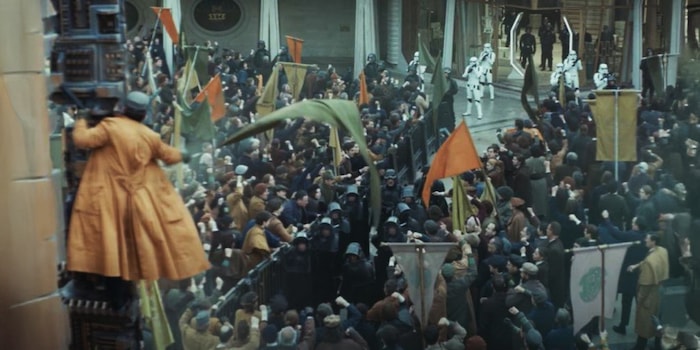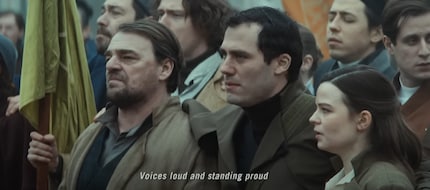
Review
Andor: a rebellion at the heart of the brand
by Luca Fontana

When someone utters the word «genocide» for the first time in the middle of Andor, Star Wars shows how truth is systematically destroyed – and why this tells us more about the world we live in than about a galaxy far, far away.
Warning: this is an opinion piece with spoilers on episodes seven, eight and nine of the second season of Andor.
In my spoiler-free review of the series, I’d already described the Empire as a «cold, bureaucratic extermination machine». I referred to the «rebellion at the heart of the brand». And that Andor doesn’t just feel like an excellent genre contribution, but rather like the most important thing the Star Wars universe has ever produced.
I wasn’t allowed to mention it back then. I could only hint at what Andor really dares to do. Now, with the release of episodes eight and nine listed as two of the ten highest-rated episodes in television history on IMDB – it’s time to talk openly about it.
The square rumbles. People stand close together, wrapped in the colours of Ghorman – or what’s left of it. Their voices are first murmurs, then shouts, then a chorus. «We are the Ghor!»
The planet’s capital is reminiscent of Paris, somewhere between the Belle Époque and the post-war period. The language, soft and musical, sounds like French – only broken by the fear that this could be its last day. Because what looks like a riot is actually a cry for help. «We’re being slaughtered! Is there no one out there who can help us?» the Ghorman resistance later broadcasts desperately to the galaxy over the free radio.
No one replies. Ghorman’s downfall has been precisely organised – the empire has prepared a cannon to explode at the right moment for the media.
Outside on the square, a man begins to sing – alone, shaking. The Ghorman hymn. His voice doesn’t carry far in the turmoil, but it’s enough. A second person joins in. Then a third. And suddenly the crowd rises like a single great body of sound, resisting the oppression of the fascist system and the silence of the core worlds.
Meanwhile, the correspondents from Coruscant speak of a «serious security risk», of «local enforcement failing» and of the «rebellion against peace» that needs to be shut down. What the reporters from the galaxy watching aren’t saying is that they’re not practising an unprovoked uprising here. A massacre of the population is taking place so that the planet’s resources can then be exploited without resistance.
Genocide.
And nobody cares.
Andor is a series that dares to be critical of the system without preaching morality and, at the same time, reaches deep into the political reality of our real world. Because what we see on Ghorman isn’t misfortune. It’s an example. A systematic, militarily planned attack on an entire population. And the most deceitful thing about it: it follows the rules. It’s noted in files, discussed by officers, relativised by politicians – the aforementioned «cold, bureaucratic extermination machine».
What’s worse is that they know the number of deaths. The genocide takes place in the bright light of day when all cameras are focused on the perpetrators – and yet no one intervenes. As if there were an explosion that shook the ground, but whose echo nobody wanted to hear. The reason? The empire had already sown mistrust among the people. Fear of the allegedly oppositional Ghor. Emotions strong enough to make a frightened public overlook control and surveillance measures that they’d usually never agree to under other circumstances.
Sounds familiar, doesn’t it?

Andor has managed to stage this tipping point with surgical precision, without specifically referring to a single real conflict or a real government. Instead, it’s about mechanisms that we know from history and that we can observe again in many places today: systematic eradication, authoritarian tendencies, populism, information control, propaganda, intimidation. Not only in Russia, the Middle East or America. Everywhere. Even in Europe and Asia.
In fact, Tony Gilroy, the man responsible for Andor, has never claimed that his series is about anything or anyone in particular. But it’s quite possibly about many truths that are happening or have happened all over the world. And that’s precisely what makes Andor so incredibly valuable – especially today.
Here’s the thing, Andor uses science fiction not as an escape, but for confrontation. It’s not about whisking us to a galaxy far, far away. It’s about holding a mirror up to ourselves so that we see things we often prefer to ignore. A world in which information control has become a weapon. In which the truth is distorted, concealed or erased. And in which silence is often the greatest crime.
The most impressive example of this is the speech Senator Mon Mothma gives in the Senate following the Ghorman Massacre perpetrated by the Empire. An accusation against the system – against Palpatine himself.
These are oppressive images that resonate. Images in Andor that remind us how close fiction and reality are.
«Of all the things at risk, the loss of an objective reality is perhaps the most dangerous», she says. «The death of truth is the ultimate victory of evil. When truth leaves us, when we let it slip away, when it is ripped from our hands, we become vulnerable to the appetite of whatever monster screams the loudest.»
Ooof.
This isn’t a fairy-tale science fiction adventure any more. This is commentary, contemporary literature and history at the same time. You could tell the story of Andor at any point in the last 6000 years – and it would describe much of what people from any period experienced. That’s how universal it is.
That’s what Gilroy has created here. Not just an allegory, but a memorial. A remembrance. Of the Wannsee Conference (page in German), the Gulf of Tonkin incident (page in German). and the burnt truths after the Reichstag fire (page in German). Tony Gilroy is reminding us: whoever has power, writes our history.
And Andor reveals how deceitful this power deals with reality.
The moment when Mon Mothma loudly shouts «genocide» is deliberate. It breaks taboo. For Disney too. The «rebellion at the heart of the brand». One that not only makes the other senators cry out in disgust, but probably also many a Star Wars fan who would prefer their galaxy be apolitical.
Gilroy doesn’t care about that. At this moment, he turns Andor into more than a spin-off, a prestige series or a political thriller with a Star Wars logo. It’s a wake-up call. One that vibrates like the square on Ghorman. One that sings before outraged fans demand silence. And which shows us how good this universe can be – when it finally has the courage to be true.
Star Wars has never been this good before. And perhaps can’t be repeated. But this is what it looks like when entertainment doesn’t just entertain, but also takes responsibility.
I write about technology as if it were cinema, and about films as if they were real life. Between bits and blockbusters, I’m after stories that move people, not just generate clicks. And yes – sometimes I listen to film scores louder than I probably should.
This is a subjective opinion of the editorial team. It doesn't necessarily reflect the position of the company.
Show all